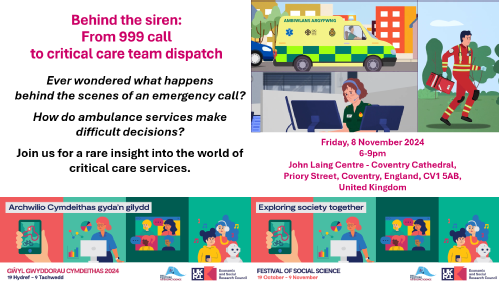Press Releases
First UK Study on Emergency Dispatch Processes to be Showcased at Social Science Festival
Researchers from The University of Warwick will showcase a study into improving NHS emergency dispatch decisions, aiming to better allocate life-saving care under pressure at this years ESRC Festival of Social Science.
The study explores how the 999 dispatch processes could be enhanced to improve care efficiency, relieve strain on emergency services, and ultimately save lives. Festival attendees will get an exclusive look into this research, hearing from Warwick researchers and paramedics on the front line. The research reveals how call-handling protocols, team coordination, and critical care dispatch systems can be optimised to prevent ambulance overload and avoid missed emergencies.
The research reveals how call-handling protocols, team coordination, and critical care dispatch systems can be optimised to prevent ambulance overload and avoid missed emergencies.
While previous studies have focused on routine ambulance work, this is the first UK investigation into the dynamics of dispatching critical care teams, particularly in the context of the post- COVID-19 pandemic.
Professor Jo Angouri, who co-leads the research team says, “Our interdisciplinary research combines social and health sciences to enhance technology, training, and policy in emergency healthcare.
“The make-up of the team is unique, and for the first time in the UK, we are taking a holistic look at the 999 decision-making system for critical care dispatch. By examining communication practices within control rooms, we aim to design systems that improve patient outcomes and support EMS staff.”
This project involves a collaboration among The University of Warwick, Welsh Ambulance Services University NHS Trust (WAST), the Emergency Medical Retrieval & Transfer Service (EMRTS), Wales Air Ambulance Charity (WACC), and the University of Bristol.
The study's findings have been translated into resources to inform training programmes, enhance emergency protocols, and guide policy development in trauma and critical care. These tools will support healthcare professionals and policymakers, helping trauma teams and emergency workers improve current practices.
The findings will inform training for ambulance and critical care staff and influence policy changes to better allocate NHS resources, ensuring emergency teams deliver timely and effective care to those in urgent need.
If you'd like to learn more about this research, along with many other fascinating social science studies and stories, check out the ESRC Festival of Social Science, with events taking place in the coming weeks. You can find out more here.
ENDS
Notes to Editors:
For more information on the study, please visit the full project page.
The accompanying YouTube video can be viewed here.
The outcomes and resources from the Landscaping Risk in Medical Emergencies study are now publicly accessible here.
